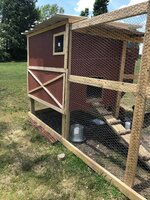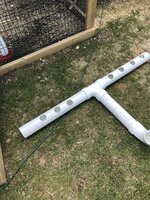Beard4
Songster
Our chicken run smells like well chicken manure which I would assume is normal, but would love the best way to clean it out.
For the last 4 days it has rained non-stop (and the chickens won't go in during rain), our run has stayed pretty wet, which I thought would clean out some poop.
However, the chickens like scratching all of there food out of their feeder. Which apparently has made a moldy mess, I assume.
1. Would spraying apple cider vinegar water and letting dry help kill the mold?
2. What do I do about the feed they scratch out, i usually just fill the feeder in the morning and leave it?
3. How to clean there run? And if that includes adding more dirt what is the best to get?
I have some DE I will be adding to the inside of there coop, and I have added a little here and there to the dirt inside the run.
Please help this new chicken mama here.
For the last 4 days it has rained non-stop (and the chickens won't go in during rain), our run has stayed pretty wet, which I thought would clean out some poop.
However, the chickens like scratching all of there food out of their feeder. Which apparently has made a moldy mess, I assume.
1. Would spraying apple cider vinegar water and letting dry help kill the mold?
2. What do I do about the feed they scratch out, i usually just fill the feeder in the morning and leave it?
3. How to clean there run? And if that includes adding more dirt what is the best to get?
I have some DE I will be adding to the inside of there coop, and I have added a little here and there to the dirt inside the run.
Please help this new chicken mama here.
Last edited:





